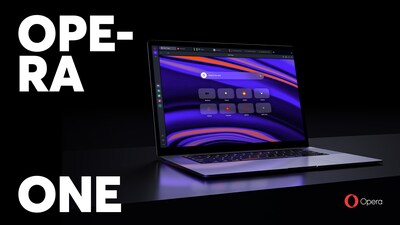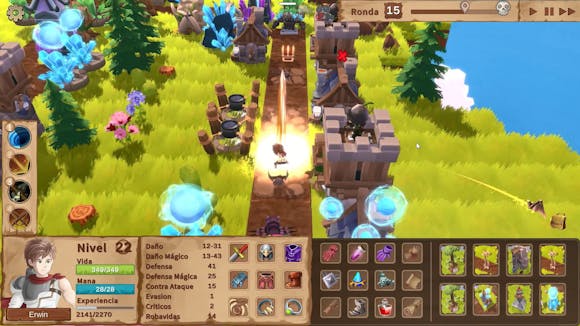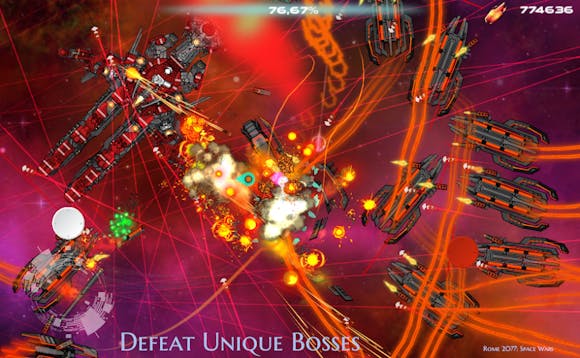OSLO, Norway, June 20, 2023 /PRNewswire/ — Opera One, the latest incarnation of the Opera browser, is out of testing and ready for download. What would have been the 100th version of Opera now marks the beginning of a new evolution cycle for the Norwegian browser company’s flagship product.

Redesigned from the ground up to usher in a new era of AI-based browsing, Opera One is the first browser to come with an integrated browser AI, Aria. Aria can be reached via a new command line, as well as from the browser sidebar. It offers free access to a leading GPT-based solution along with up-to-date information from the web.
Since earlier this year, Opera has been making bold moves in the generative AI space in order to provide its users with a reimagined browsing experience that boosts their productivity and creativity through various ways of interacting with browser AI.
“As people who obsess over browser innovation, we saw fit to rethink the role of the browser in light of the recent developments in the AI space. As opposed to other browser companies, Opera didn’t simply add AI services to its browser. We went back to the drawing board and redesigned our flagship browser. Opera One is built around Aria, our native browser AI, and is the culmination of our work so far,” said Joanna Czajka, product director at Opera.
The first Opera browser with native browser AI
Aria, Opera’s new browser AI, is a key component of Opera One and the first Opera feature that named itself. With Aria, Opera One users are getting access to a leading generative AI service for free. The service is a result of Opera’s collaboration with OpenAI, but with expanded capabilities.
Based on Opera’s own Composer AI engine, Aria connects to OpenAI’s GPT and is enhanced by additional capabilities such as adding live results from the web. Aria is both a web and browser expert that allows users to collaborate with AI while looking for information on the web, generating text or code, or getting their product queries answered. When it comes to customer support, Aria is knowledgeable about Opera’s entire database of support documentation and uses the company’s current product knowledge to answer users’ questions.
Opera One users are also getting a brand new command line that allows them to use the ctrl+/ (Win) or the cmd+/ keyboard shortcut to display an overlay and interact with Aria. Whenever a question comes to mind, they can use the command line to ask Aria a question and either interact with the browser AI’s response immediately in the sidebar or go back to browsing.
Aria also makes use of the AI Prompts feature Opera introduced earlier this year in early access. Following user feedback and extensive testing, the ability to get contextual prompts by right-clicking or highlighting text in the browser is now plugged into Aria as well.
Acknowledging the popularity of ChatGPT, Opera One also offers users access to the popular service in the browser sidebar.
As opposed to other browser solutions, the AI in Opera is a user-controlled experience, which means users can choose to opt into AI services or to not engage with them. To use Aria, they have to open the browser AI in the sidebar and log in or sign up for a free Opera account if they don’t already have one.
Tab Islands: a new, intuitive way of interacting with tabs
A key element of Opera One is Tab Islands, and the way they change how the browser’s tabs behave. Tabs are a fundamental part of browsing but the standard way of interacting with them hasn’t evolved much since the early days of the web and no longer corresponds to the richness of the internet and the countless ways we utilize it. For example, researchers have found that the existing tab design in browsers makes it difficult to jump between sets of tasks. Moreover, according to Opera’s own research, the majority of people feel overwhelmed by how messy their tabs get and wish web browsers would do more to help them manage this.
Opera One’s Tab Islands address this challenge. Tab Islands are a new way of keeping related tabs together in an intuitive way, based on context – without forcing users to change their habits or to even give it a thought. Users gain flexibility in interacting with their tabs: they can keep different browsing contexts separate, move tabs around, collapse islands to make them small and come back to them later or save them into bookmarks or pinboards.
When a user creates a trip itinerary and researches hotels and routes, the tabs opened in that context will stay together in a dedicated tab island. Or maybe they have a bunch of Google Docs they use for work? They, too, will automatically get a tab island of their own. As they browse and more tab islands are created, Opera One users can easily distinguish the topics they were focusing on and switch between them.
Opera One’s new Modular Design and new architecture with Multithreaded Compositor for smoother navigation than ever
Opera has a history of reinventing itself to address the changing needs of its users as well as the evolving nature of the web. With Opera One, the browser has been redesigned according to Modular Design. The new design philosophy, which is being implemented in Opera’s flagship today for the first time, allows Opera to over time build a more powerful and feature-rich browser that is ready for a generative AI-based future. The Opera browser is thus beginning its metamorphosis into a browser that will dynamically adapt to users’ needs by bringing only the key features to the foreground: the relevant modules within Opera One will adjust automatically based on context, providing the user with a more liquid and effortless browsing experience.
Beyond rethinking the look of its interface, Opera also re-engineered its desktop browser under the hood, implementing a new browser architecture with a multithreaded compositor to deliver a faster and smoother user interface layer. With the Multithreaded Compositor, Opera One is the first major Chromium-based browser that brings its UI to life like never before. Combined with the new Modular Design Principles, this new architecture enables the implementation of new features and allows Opera to continue its differentiation from other Chromium-based browsers.
Opera One is the beginning of a new evolution cycle for the flagship Opera browser with many more AI-centric updates that will vastly enhance the users web experience planned for later this year.
Download Opera One now
Generative AI is here to stay and Opera One offers an intuitive entry point into the space, allowing users to immediately start enhancing their lives by tapping into its potential in a controlled way.
Hugely popular in the developer version, Opera One is now ready for download. Don’t miss out on the only way to get a ChatGPT 3.5-level service expanded with live results from the web for free.
Opera One is available for free on Windows, macOS, and Linux. To download it go to https://opr.as/opera-one
About Opera
Opera is a web innovator building on more than 25 years of innovation that started with the Opera web browser. While Opera is leveraging its brand and engaged user base in order to grow and develop new products and services for people who seek a better internet experience, Opera’s PC and mobile web browsers, content discovery platform Opera News, and apps dedicated to gaming, Web3 and e-commerce are already the trusted choices of hundreds of millions of active and engaged users. Opera is headquartered in Oslo, Norway, and listed on the NASDAQ Stock Exchange under the OPRA ticker symbol. Download and access Opera’s products and services from www.opera.com.



